In order to obtain your Texas divorce decree, you should go to the district clerk’s office in the county where your divorce took place. The decree contains information on asset distribution, child custody, and debt allocation. Don’t forget to bring identification, such as a Texas driver’s license. Official copies are necessary for legal purposes and to avoid delays in the future. While online resources can provide basic information, official copies must be obtained in person. Costs vary by county and expedited services may incur additional fees. Knowing the processing times and specific requirements will ensure a smooth retrieval process. Remember, valid proof of identity is required. For more information on divorce documentation and legal validity, further exploration is necessary.
Key Takeaways
- Visit district clerk's office in county of divorce for decree.
- Bring Texas driver's license for identity proof.
- Obtain certified copies for legal validity.
- Understand fees and processing times.
- Ensure privacy and legal binding of decree.
Divorce Decree Requirements
When obtaining our Texas divorce decree, we must make sure we visit the district clerk's office in the county where the divorce was granted. This visit is important as the divorce decree serves as a significant legal document detailing important aspects such as asset distribution, child custody arrangements, and debt allocation.
To ensure a smooth process, remember to bring along identity proof, such as a Texas driver's license that matches the information on the decree. Certified copies of the decree are essential for future legal needs, like name changes or property disputes. Having these copies on hand can save time and hassle down the road.
Online Search Process
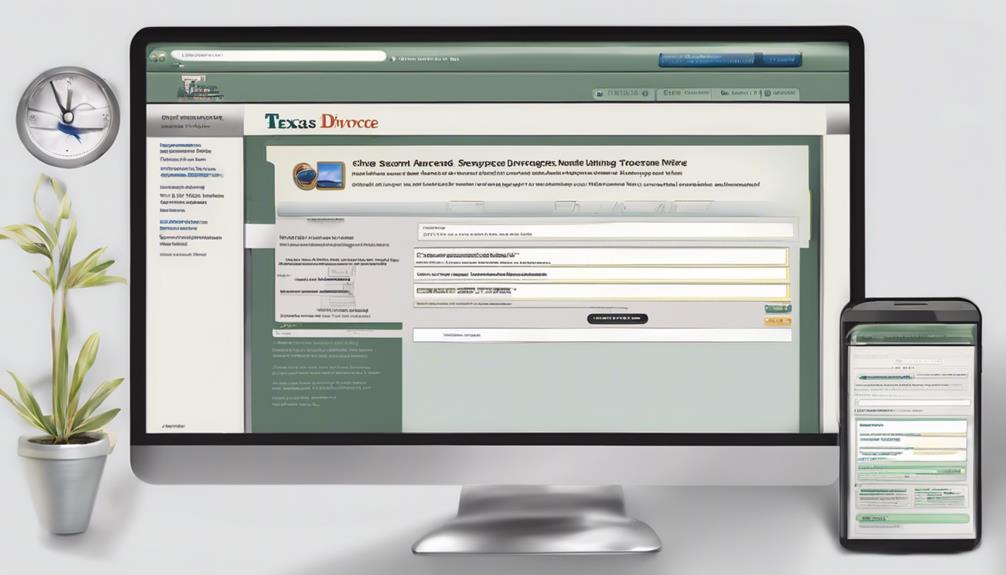
Exploring online resources for Texas divorce decrees can provide preliminary information, although certified copies must be obtained in person from the relevant county or district office.
While online search tools may offer general details about divorce records, access to certified copies is typically restricted to the involved parties.
It's important to note that most Texas divorce decrees aren't readily available for online viewing due to privacy concerns.
The county or district clerk websites usually contain valuable information on how to obtain these documents, including the specific procedures and requirements for in-person requests.
When seeking a certified copy of your divorce decree, you'll need to visit the county or district where the divorce was finalized.
Remember that online searches may help you gather initial insights, but the actual certified copies must be procured through the appropriate office, ensuring the authenticity and legal validity of the document.
Requesting Certified Copies
When requesting certified copies of your Texas divorce decree, we need to provide specific information like our full names, dates of birth, and the county where the divorce was finalized.
Understanding the fees associated with obtaining these certified copies is important as they can vary depending on the county and additional services required.
Processing timeframes for receiving the certified copies can also differ, so it's advisable to inquire about this aspect to plan accordingly.
Required Information for Request
How can we ensure our request for a certified copy of our Texas divorce decree is processed efficiently?
When requesting a certified copy of your Texas divorce decree, make sure you provide the following information:
- Full name, including maiden name if applicable.
- Place where the divorce decree was issued and the date of the final decree of divorce.
- Case file number related to your divorce decree for faster processing.
- Valid proof of identity, such as a Texas driver's license matching the decree information, when obtaining your divorce decree from the district clerk's office.
Fees for Certified Copies
Understanding the cost structure for obtaining certified copies of Texas divorce decrees is important for smooth processing of your request. The fee for a certified copy typically ranges from $20 to $25, with additional charges for rush services or expedited processing.
Keep in mind that fees may vary depending on the county where the divorce was granted. Some counties in Texas provide online services for requesting and paying for certified copies, offering convenience and efficiency.
When requesting a certified copy of a Texas divorce decree, it's essential to inquire about the specific fee structure and available payment options. Stay informed about potential extra charges for rush services and explore online services for a seamless experience.
Processing Timeframes
Let's expedite the process of obtaining certified copies of Texas divorce decrees by understanding the various processing timeframes available. Here are some key points to take into account when requesting your certified copy:
- Some county clerk's offices offer same-day processing for in-person requests.
- Mail-in requests may take a few days to weeks to process.
- Expedited services may be available for an additional fee to receive your certified copy faster.
- Online requests for certified copies of divorce decrees may have different processing times depending on the county's system and workload.
It's advisable to check with the specific county clerk's office where the divorce was filed to get the most accurate information on processing timeframes.
In-Person Retrieval Procedures
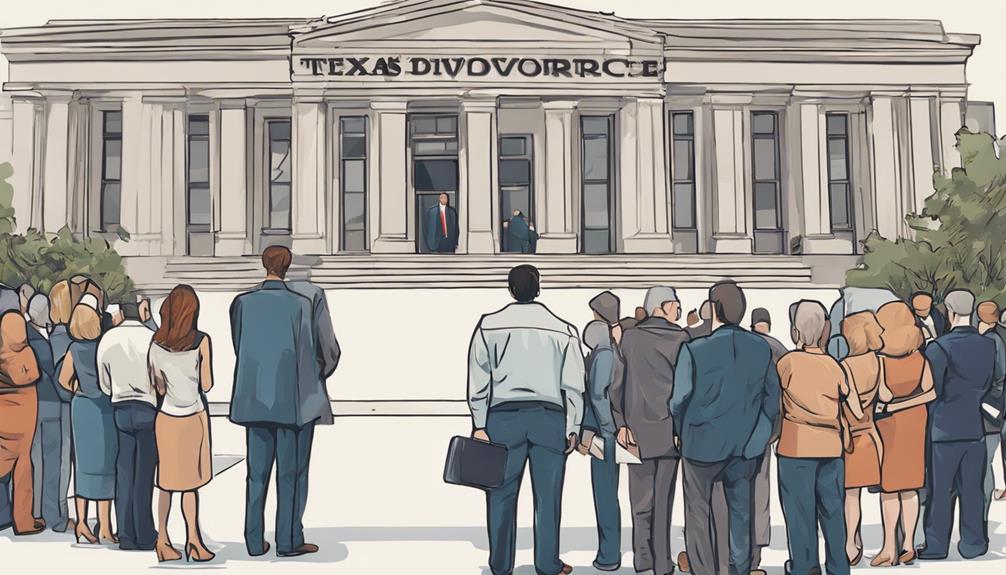
When obtaining your Texas divorce decree in person, it's important to visit the Vital Records Office at the specific county or district clerk's office where the divorce was filed. Remember to bring valid identification, such as a Texas driver's license matching the information on the decree, to guarantee a smooth retrieval process.
Accessing your divorce decree in person guarantees that you receive an official document with the court seal for any legal requirements.
Visit Vital Records Office
Upon arriving at the Texas Essential Records Office, we'll need to present valid identification and provide the necessary details of our divorce for verification purposes.
When visiting the office for your divorce decree, follow these steps:
- Approach the designated desk for divorce decree retrieval.
- Submit your identification and divorce details for verification.
- Await the processing of your request by the office staff.
- Once verified, receive your divorce decree or further instructions.
Access to the divorce decree is only granted to involved parties or their legal representatives. By following these procedures diligently, you can efficiently obtain the necessary documentation for your records.
Bring Valid Identification
Valid identification, such as a Texas driver's license matching the decree information, is a necessity for the in-person retrieval of a Texas divorce decree. When you head to the district clerk's office in the county where your marriage was dissolved, remember to bring your Texas driver's license for verification. This step is vital in the retrieval procedures for obtaining a certified copy of your divorce decree.
The district clerk will use your valid identification to confirm your identity before releasing the document to you. Ensuring that your Texas driver's license details align with the information on the decree is essential for a smooth retrieval process. By having the necessary identification on hand, you pave the way for a hassle-free experience in obtaining your divorce decree in Texas.
Types of Divorce Documentation
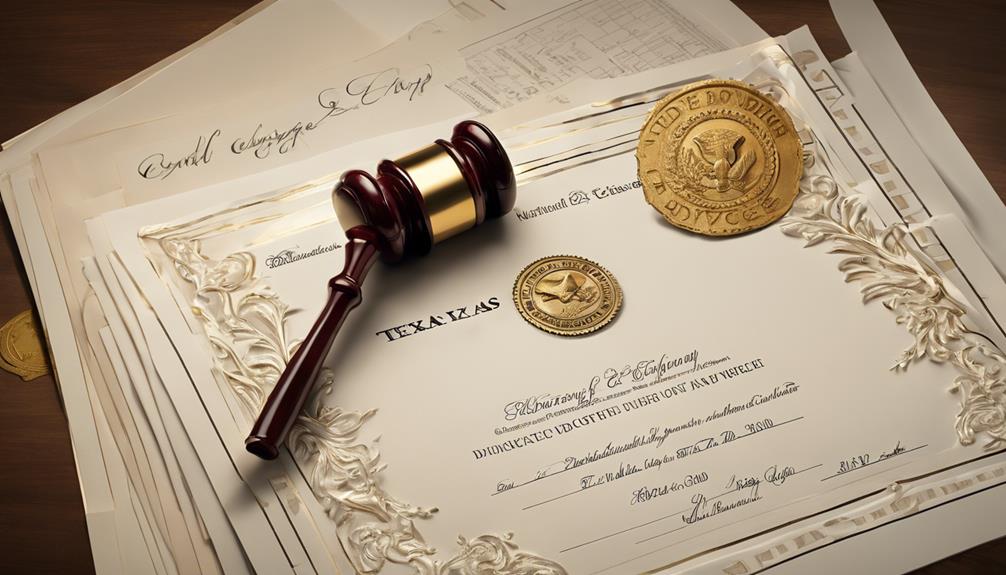
Different types of divorce documentation play an important role in legal proceedings and are essential for confirming divorce details and agreements between parties. When seeking divorce records, it's crucial to understand the different types of documentation available:
- Certificate of Divorce: This basic document confirms essential divorce details, such as the names of the parties and the finalization date.
- Standard Divorce Decree: Includes important information like the judgment, child custody arrangements, property division, and spousal support agreements.
- Dissolution of Marriage Record: Contains detailed documentation of all court proceedings related to the divorce, including financial matters and asset distribution.
- Petition for Divorce: Initiates the legal process of divorce by formally requesting the dissolution of the marriage, outlining the grounds for divorce and any initial requests for property division or child custody.
These documents are created and finalized after the divorce process, serving specific purposes and varying in detail to ensure clarity and legal validity.
Fee Structure for Accessing Records

When accessing records for a Texas divorce decree, the fee structure varies by county. The fees associated with obtaining certified copies can range from as low as $1 to around $30.
Additional charges may apply for rush service or expedited requests, depending on the county's policies. Some county or district clerks' offices offer online payment options for added convenience. It's important to note that specific fees and payment methods are determined by the individual county clerk's office, so it's advisable to check with them directly for accurate information.
If you require a divorce decree urgently, inquire about rush service options and any associated fees. The Essential Statistics Section of the Texas Department of Health and Human Services may also provide guidance on obtaining divorce records and the corresponding fees. Be sure to clarify all payment details and any available expedited processing services before proceeding with your request.
Understanding Divorce Decree Content
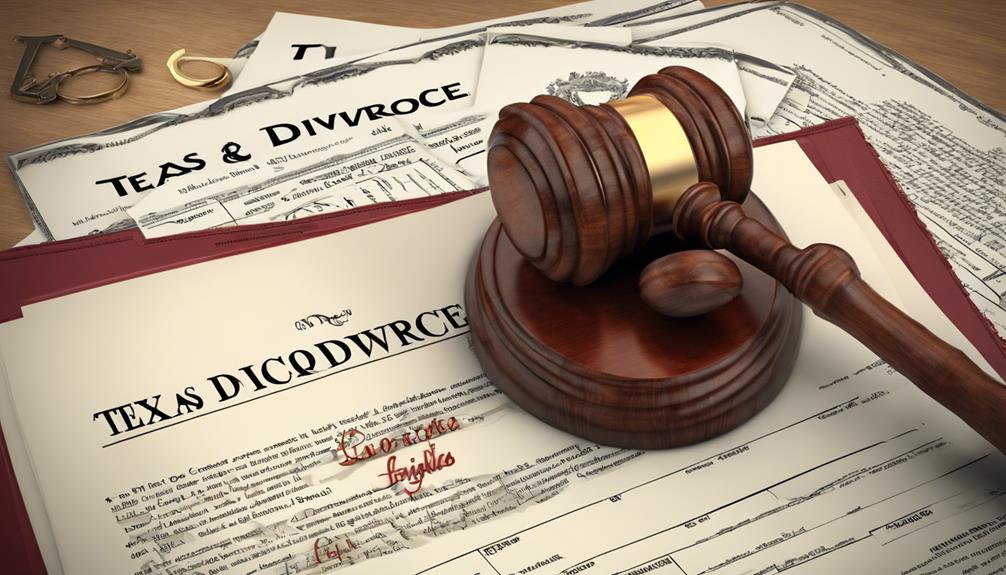
Exploring the components of a Texas divorce decree provides a comprehensive understanding of the legal agreements and obligations established during the dissolution of marriage. When reviewing your Final Divorce Decree, pay close attention to the following key details:
- Child Custody: Details regarding custody arrangements and visitation schedules for any children involved in the divorce.
- Financial Responsibilities: Information on support payments, health insurance obligations, asset distribution, debt allocation, and retirement fund allocations.
- Court Information: Court costs, the district where the divorce was filed, the judge's name, and the case number for reference.
- Signatures and Copies: Signatures of both parties involved in the divorce, and the importance of obtaining certified copies for legal verification purposes.
Understanding the contents of your divorce decree is essential for ensuring compliance with the agreed-upon terms and for future reference. Keep these records safe, and consider obtaining additional copies from the State Vital Statistics office or the district court where the divorce was finalized.
Legal Validity of Divorce Decrees
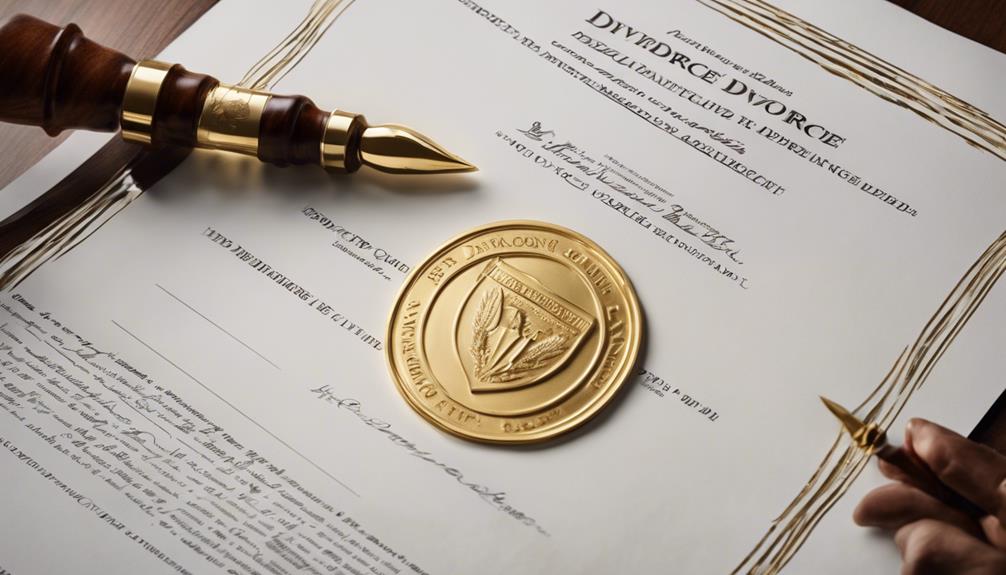
Understanding the legal validity of divorce decrees in Texas is essential for ensuring the enforceability of agreements and the protection of rights post-divorce.
A Texas divorce decree is a legally binding document that signifies the official dissolution of a marriage. It encompasses vital details like child custody arrangements, asset distribution, debt allocation, and any other agreements made during the divorce proceedings.
This document must be acquired from the district clerk's office in the county where the divorce was filed. It serves as a cornerstone for legal matters, facilitating the enforcement of agreements, name changes, and proof of divorce terms.
The Texas divorce decree holds full enforceability within the state, outlining the rights and responsibilities of each party following the divorce. It's imperative to comprehend the implications of this document to navigate the aftermath of a divorce smoothly, ensuring that all parties uphold their obligations as stipulated in the decree.
Privacy and Access to Decree Records

Access to Texas divorce decree records is restricted to maintain confidentiality and protect personal information. When seeking access to these records, it's important to understand the privacy measures in place. Here are some key points to take into account:
- Limited Accessibility: Texas divorce decree records are private documents that are generally only accessible to the parties involved in the divorce proceedings.
- Confidentiality Protection: Access to divorce decrees is restricted to safeguard the confidentiality of personal and sensitive information contained within the documents.
- Legal Authorization: Individuals must typically be one of the parties named in the decree or have legal authorization to obtain the document.
- Privacy Safeguards: Courts prioritize protecting the privacy of individuals by limiting access to divorce decree records, ensuring that personal details and agreements are kept confidential.
Understanding these aspects of privacy and access to divorce decree records in Texas is essential for those seeking to obtain their decree while respecting the confidentiality of the information contained within.
Frequently Asked Questions
How Do I Get a Copy of My Divorce Decree in Texas?
We visit the district clerk's office in the county where the divorce was granted. We present identification matching the decree information. The decree outlines custody, assets, debts, and signatures. Make sure you have the required details and ID.
How Long Does It Take to Get a Divorce Decree in Texas?
We typically receive a Texas divorce decree within 30-60 days post-final hearing. Variations in court schedules and workload can affect this timeline. For faster service, expedited options are available for an extra fee.
What Steps Must Be Taken to Obtain a Final Divorce Decree in Texas?
To get a final divorce decree in Texas, we file the Original Petition, attend a final hearing, and collaborate with our spouse. Then, we obtain certified copies from the district clerk's office, containing essential details and signatures.
How Much Is a Divorce Decree in Texas?
A divorce decree in Texas typically costs between $1 to $10, varying by county. Additional fees may apply for expedited processing or certified copies. Some counties offer online services for added convenience.
What Is the Importance of Residency Requirements When Obtaining a Texas Divorce Decree?
When meeting Texas residency requirements for a divorce decree, it is crucial to establish legal eligibility. Residency guidelines ensure that only those with a genuine connection to the state can file for divorce there. Meeting these requirements is essential for a smooth and valid divorce process in Texas.
Conclusion
To sum up, obtaining your Texas divorce decree is a straightforward process that requires attention to detail and adherence to specific guidelines. By following the necessary steps for online searches, requesting certified copies, or in-person retrieval, you can access the documentation needed for legal purposes.
Understanding the content and legal validity of your divorce decree is essential for privacy and access to records. Remember to contemplate the fee structure for accessing records to guarantee a smooth and efficient process.










